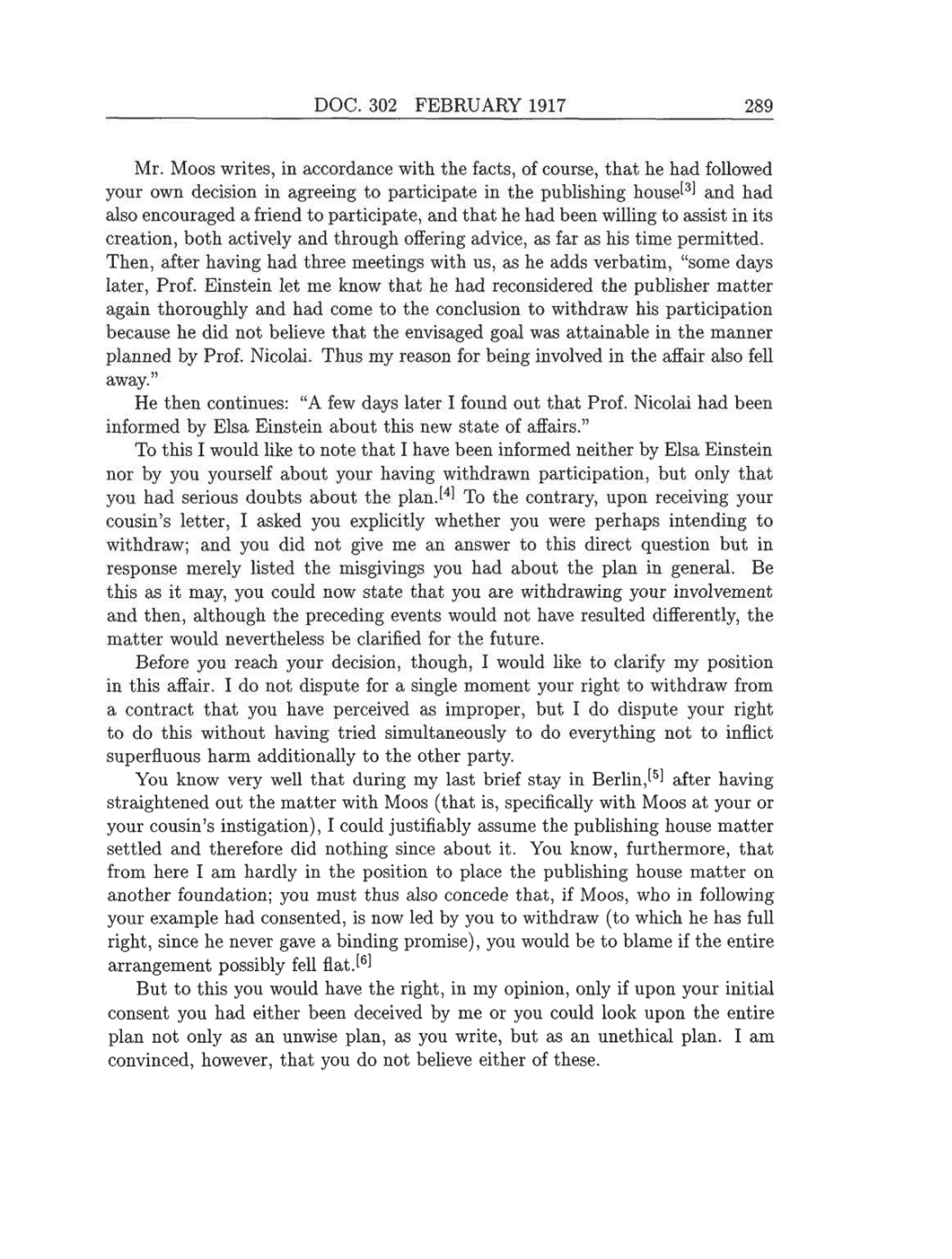DOC.
302
FEBRUARY
1917 289
Mr. Moos
writes,
in accordance with
the
facts,
of
course,
that
he
had
followed
your
own
decision in
agreeing
to participate
in
the
publishing
house[3]
and had
also
encouraged a
friend to
participate,
and
that
he had been
willing
to assist in its
creation,
both
actively
and
through
offering advice,
as
far
as
his time
permitted.
Then,
after
having
had
three
meetings
with
us,
as
he adds
verbatim,
“some
days
later,
Prof. Einstein let
me
know
that
he
had reconsidered the
publisher
matter
again
thoroughly
and had
come
to
the
conclusion
to
withdraw his
participation
because he did
not
believe
that
the
envisaged goal
was
attainable
in
the
manner
planned by
Prof. Nicolai. Thus
my reason
for
being
involved in
the
affair also
fell
away.”
He
then
continues:
“A few
days
later
I
found out
that
Prof. Nicolai
had
been
informed
by
Elsa Einstein
about
this
new
state of affairs.”
To
this
I
would
like
to note
that
I
have been informed
neither
by
Elsa Einstein
nor
by you yourself
about
your having
withdrawn
participation,
but
only
that
you
had
serious
doubts about the
plan.[4]
To the
contrary,
upon receiving
your
cousin’s
letter,
I
asked
you explicitly
whether
you were
perhaps
intending
to
withdraw;
and
you
did not
give
me an answer
to
this direct
question
but
in
response merely
listed
the
misgivings you
had about the
plan
in
general.
Be
this
as
it
may,
you
could
now
state
that
you
are
withdrawing your
involvement
and
then,
although
the
preceding
events would not have resulted
differently,
the
matter would nevertheless
be
clarified for
the
future.
Before
you
reach
your decision, though,
I
would
like
to
clarify my position
in
this
affair.
I
do not
dispute
for
a
single
moment
your right
to
withdraw from
a
contract
that
you
have
perceived
as
improper,
but
I
do
dispute
your
right
to do
this without
having
tried
simultaneously to
do
everything
not to inflict
superfluous
harm
additionally
to
the other
party.
You know
very
well
that
during my
last brief
stay
in
Berlin,[5]
after
having
straightened
out
the
matter with
Moos
(that
is, specifically
with
Moos at
your
or
your
cousin’s
instigation),
I
could
justifiably
assume
the
publishing
house matter
settled
and therefore did
nothing since
about
it.
You
know, furthermore,
that
from here
I
am
hardly
in
the
position
to
place
the
publishing
house
matter
on
another
foundation;
you
must
thus also concede that, if
Moos,
who in
following
your example
had
consented,
is
now
led
by you
to
withdraw
(to
which he has full
right,
since he
never gave a
binding
promise),
you
would be to blame
if
the
entire
arrangement
possibly
fell flat.[6]
But
to
this
you
would have
the
right,
in
my opinion, only
if
upon your
initial
consent
you
had
either been deceived
by
me or
you
could look
upon
the
entire
plan
not
only
as an
unwise
plan,
as
you write,
but
as an
unethical
plan.
I
am
convinced, however,
that
you
do not believe either
of
these.
